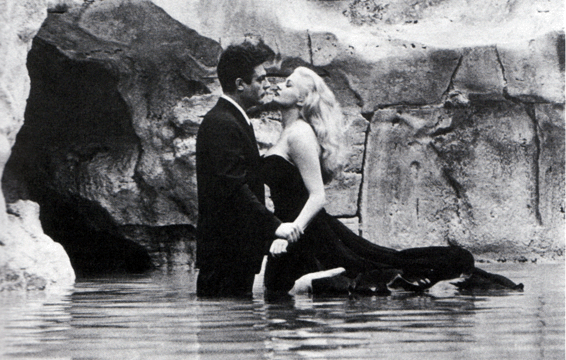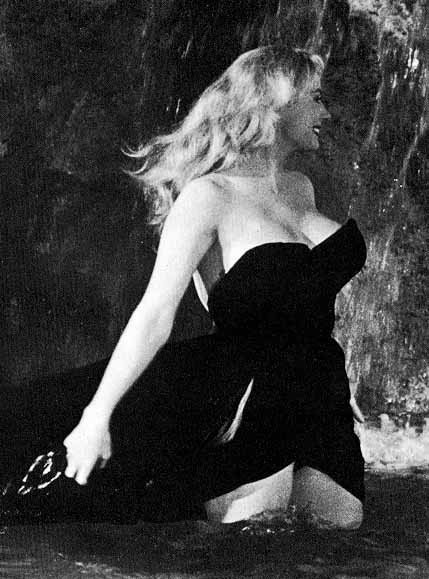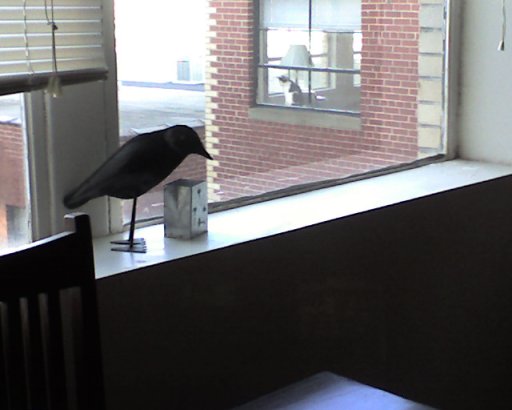March 31, 2006
Blue
Listening to Brian Lehrer's segment on The Blue Book. The book provides details on corporations to help the consumer buy within their political and moral beliefs (think Target and their jackassery with allowing pharmacists to pick-and-choose on prescriptions). Anyway, one of the reviews of the book at Amazon pointed to a Daily Kos article outing the publisher of the book as a possible thief, stealing information and methodology from BuyBlue.org. Not sure what's true, but I think BuyBlue.org will be my first stop. Oddly, the two negative reviews on Amazon referencing the conflict have been voted as non-helpful (4/14 for the one-star review and 7/25 for the three-star review). An issue definitely worth consideration.
Brian Lehrer did not discuss the publishing controversy (I emailed him the info, not wanting to call while I'm here at work), but a caller on the show brought up questions on the appropriateness of personal boycotts--some questions I've also been thinking about. If companies are working within the law, why demand more? Well, government is slow, so--as with the examples given on the show such as Apartheid and Kathy Lee's sweatshops--it's the consumers' responsibility to act their morals. However, at some point we get to a masses-make-right morality which, let's face it, can go horribly wrong: slavery, Japanese internment, good-ole-boy racism, and glass ceilings. The Target example is a good illustration of the problem. I'm boycotting for an action whose opposite others boycott against. Those others without question are wrong of course, because I'm right of course, but our actions are otherwise equal. The act of boycotting is belief--and truth--agnostic.
At its heart, boycotting is a method to effect change, but I think ultimately you do it to obey your personal beliefs. If the world ultimately agrees with you, great. If not, you've at the very least acted appropriately to your own system of morals.
March 28, 2006
Seven Sherlock Holmes movies
After getting pointed to a Sherlock Holmes blog by the singularly perceptive A. C. Douglas, I dug through and found a reference to public domain torrents where you can download eight Holmes movies. Not being the most keen-eyed fan, I found seven grouped together and ordered them before noticing the eighth. Free to torrent, if you have the time, but almost as free to purchase on DVD: $1 each with a minimum of five movies. They come in AVI format and the quality is not great, but they appear watchable.
How do these fit in the canon? Well, they're set in the 1930s/1940s, so they present sort of an alternate-reality canon. Below are the movies in film order, with the story name (taken from the chronological table in the back of Volume I of Klinger's edition) and dates of their occurrence (in Holmes' life) in brackets. Four are from Conan Doyle's material, three are original screenplays also available on the cheap at Amazon.
- The Sign of Four (1932), The Sign of Four [1888]
- A Study in Scarlet (1933), A Study in Scarlet [1881]
- Silver Blaze aka "Murder at the Baskervilles" - USA (1937), "Silver Blaze" [1888]
- Sherlock Holmes and the Secret Weapon (1943), "The Dancing Men" [1898]
- The Woman in Green (1945)
- Dressed to Kill (1946)
- Terror by Night (1946)
Where was I?
All roads lead to Dan and Alicia's wedding. Thursday was hanging with Dan and his Crazy Friends at Five Seasons in preparation for the Saturday wedding. I was the only one without a nick-name. Friday was the rehearsal dinner at their house catered by none-other-than The Varsity. I've never had so much grease flowing through my veins since, well, since the last time I ate Varsity. With The Varsity involved in your wedding, you qualify as Atlanta royalty. Brilliant. Lisa dressed from the future and then did a cowboy dance:

Wacky!

The wedding proper was on Saturday at Rhodes Hall, a wonderful late-Victorian castle (also described as Romanesque or Victorian Romanesque). A little cold for an outside wedding but very fun and always a good reason to get together with friends. Afterwards was continued drinks at Midcity Cuisine where I met the bartender, Bethany Marchman (a friend of friends at the wedding), who is a very accomplished painter.
Second wedding of the year with two more lined up. A personal best.
Club
Finally got the video when we were at Crobar in New York [ 24-second, 4-meg AVI; stream using Winamp ] in June of last year. Shelby recorded it on her phone. I don't remember it being that chaotic.
March 25, 2006
Subversion
Two humorous jabs, at religious conservatives (parodying this piece of crap):
And at ... more religious conservatives:
Continue reading "Subversion"Civility
Shut up with the irrelevant argument over whether Iraq is-or-is-not in a civil war. The label doesn't matter when the facts are obvious: Iraq is in chaos and different factions are vying for power. Call it whatever you want, it doesn't change the screw-up that we've made of the place. Arguing over the "civil war" issue is simply a way to avoid talking about the real problems.
March 24, 2006
The sing-along beard
Possibly the funniest comic I've ever read in my life, ever, was one that I had read years ago posted on the Internets called "The Sing-along Beard." It told a completely ludicrous morality tale about the harm caused by following fads. The particular fad of the story was a fake beard marketed as (for no particular reason) The Sing-along Beard and which became insanely popular. Chaos ensued.
So, for no particular reason, I was thinking about it recently and decided to look it up. Nothing. The only hit I get is a post in rec.sport.pro-wrestling.moderated where someone used a quote from the comic in their sig. College boy thinks he's too good for the sing-along beard, huh?
Can you believe this? My only goal in life now is to find that comic.
March 22, 2006
Testing
Spent the last two days in training classes for work. Nothing interesting, just basic indoctrination along with a simple personality test called DISC (my results shown below). Going in, I understood that it was to be more of a team-building experience than anything tangibly useful. I mean, how useful is it to discuss the idea that customers appreciate being treated with honesty and integrity? Who doesn't know that? Still, the understanding of what was to be expected and the acceptance of the experience never really locked into place. Ultimately, the shared experience was good (everyone in the company takes this class), but the tediousness of the material was a little grating. It's the business world, so what are you going to do?

The break from the office was nice and there was free lunch both days: always to be appreciated. I don't know that there's any way for a large company to avoid these types of classes--the minor benefit it acheives by reigning in the few who really don't know how to talk on the phone is possibly benefit enough--but it reminds me too much of the bland infinitive soup of mission/vision statements that companies churn out. Any positive recognition (if it ever occurs) is simply socially constructed with no real benefit behind it. The absence of a mission statement would only be noticed by those who would force it back into view: the board of directors. And possibly the marketing team.
A Wild Coyote in King Bloomberg's Court
Great chase scene described in the story of the coyote loose in Central Park.
We have the coyote cornered, but it remains elusive.

Shallow lit
I recently heard someone praise Robert Heinlein's novels, specifically The Moon is a Harsh Mistress, as IIRC really deep
during a tangent in a Libertarian rant in which he--get this--praised the President. You know the type. I loved reading Heinlein growing up; partly for the sexual content so desparately needed by the junior high school sci-fi reader, and partly for an expansive palette--considering the genre--that includes political and social commentary along with neat-o technical stuff. At the same time or earlier I was reading Frank Herbert and knew well who had the more incisive eye. Where Heinlein had one simple axe to grind, Herbert wrote as a student of history who could see tendencies and cycles without dogma.
This memory, and the Heinlein comment, dovetailed for me into the recent clarification presented by Mark Liberman on Language Log about the casual liguistic dogma that that ur-dogmatist, Ayn Rand, had put forth in Atlas Shrugged. Ayn Rand, loved by all Libertarians, stated (albeit through one of her characters) that the phrase "to make money," as if it were create-able as opposed to transfer-able, only exists in American english. In a later Language Log post, Paul Kay continues illuminating the absurdity of Rand's linguistic offense.
I'd read both authors with enjoyment and some passion, yet it pains me now to hear that people actually still cling to those narrow ideas. Grown people. I'm overstating the limits of both authors from these simple examples and art is always a simplification (from V for Vendetta: Politicians lie to hide the truth, artists tell lies to reveal it.
), yet flaws in those simplifications can still flaw the art. Too often, big ideas are more cunning than insightful.
March 18, 2006
Dr. Who
The new ones are really pretty good. They've retained the goofy/cheesy mood of the original along with its moments of seriousness but not too much so. I watched the first two episodes this afternoon and was pleasantly surprised. Like the little-remembered show Freaky Links, the new Dr. Who has that fun feel that The Night Stalker had. Very pleasant.
March 17, 2006
CSA (3/5), Tristram Shandy (4/5)
Saw these as a double-feature on Sunday. They have similar non-narrative conceits but each has a unique and uniquely creative approach. CSA is a fake documentary about the United States, and the world, as it would be if the Confederacy had won the Civil War. Tristram is a blend of a making-of movie and of the movie itself, which is based on a book that I am told is just as confusing and complex. At ~90 minutes each, they made for an ideal pairing.
CSA is seldom overly-serious and has many inappropriately hilarious segments. By then end, you're shocked at just how closely those inappropriate segments are to a reality that is only a few decades past. Although it's hard to seriously consider that slavery could still exist in the 21st century no matter the path of history, with lynchings occuring up to the mid 19th century in an America where slavery was ended, CSA seems not so off-kilter. After the movie, I felt that the joke just didn't hold up, even for only 90 minutes, but I've keep thinking about it and enjoying it more. There was much to appreciate and some really very funny comments. Most unprintable here. The several footnotes at the end were invaluable.
Tristram had many subtle comedic turns and yet surprisingly displayed a very honest and human portrait of the main character, played deftly by Steve Coogan. It switches between being a movie adaptation of the book and a behind-the-scenes look at the making of the movie. Coogan, with equal flair from his co-star Rob Brydon, comes across as both neurotically self-absorbed and sardonically self-confident. The frustrating stagnation of any progress in either the movie being made or the story being told is some sort of Sartean hell they're all in, yet one that is not so bleak and contains more slapstick than anguish. Very sweet and with many worthwhile moments.
Both movies should be re-watched.
Bruce Sterling's speech at SXSW
Crap. Why are people listening to this? Is there some secret value that I'm missing beyond his free association of current events and lists of Cool Things but with no coherent framework? And the arrogance--whether deserved or not--only muddies his message. Absence of message. You know how Bush will make some quotidian statement and say it like he's the first person to ever think of it? Sterling, unfortunately, reminds me of that.
March 16, 2006
V for Vendetta (4/5)
Got some tickets to a preview at Landmark from a busy LC. Thanks!
This held together better than the original graphic novel. All of the coincidences and seeming coincidences were there, along with some of the strongest writing--marked with V's theatrical speech--and most striking images--V's silhouette against the prison in flames, or Evey's rebirth in the rooftop rain. Even with the changes and rearranged scenes, Alan Moore's key narrative ideas were all there and even improved upon with some well-placed humor that added to the entertainment without interrupting the drama. The Wachowski brothers have redeemed themselves, albeit with another's writing. Good enough, and very entertaining.
Is it a comment on America? It's clearly Moore's own story, unmolested by overt commentary, which tells of a fascist state in England but that could exist anywhere. In it, the government invades citizens' privacy under the guise of protection from enemies, tortures those it feels are a threat, forgives its moral sidesteps by wearing a mantle of religious righteousness, and fabricates imaginary threats in order to keep its citizens afraid and complicit in their abuse. It also has a populace whose majority believes they are being lied to [no link available]. It's not hard to see how some would want to cry foul.
Continue reading "V for Vendetta (4/5)"March 15, 2006
Ring
I think a new cube neighbor at work has one of the Einstein on the Beach themes as his cell phone ring.

Seems unlikely, but I've been waiting for it to ring again and now of course it's not.
March 14, 2006
Good night
I had a good, short performance over at Eddie's Attic open mic last night. The rules are two songs/10 minutes, blah blah, so unfortunately you're just really getting warmed up by the time they kick you off the stage. It's sometimes a benefit for listeners but kinda sucks for the performers. Isn't that always the case?
Several friends came by to be my fan club--oddly, I could hear them as if they were the only ones clapping. I know: weird. As it turned out, my keyboard got more attention than me with no less than three other keyboard players performing that night. That is to say, there were exactly three other keyboard players. Since I was the first, it was easier to use my keyboard (the sexy P90) than to break down and set up a different one. Eddie was gracious at the end of the evening and, seeing as I was not the winning recipient of $60 and not even one of the three finalists, he offered to play roadie and help me lug the sexy-but-heavy P90 down the precarious Attic Stairs. We chatted pleasantly and I resisted the urge to ask "What were you thinking?!?" Nah, he's a really nice guy, and the atmosphere and structure is perfect. A good experience all around.
I did however forget to sign up for the next available evening. What was I thinking? Anyway, I really appreciate the friendly support. These things can be tedious if you're not reallyreally into it, so thanks again for puttin' up with everything and maybe next time Lisa will figure out how to use my camera phone and I'll have a visual document to post here displaying the incredible rock that I laid out to all the pa-zizzles. Indubitably.
Continue reading "Good night"Happy Pi day!
We were all a-buzz about Pi Day here at work. Interesting trivia heard on The Leonard Lopate Show:
- Buffon's Needle describes the emergence of Pi from a test using lined paper and a "needle" the length of the distance between the ruled lines. The Wikipedia entry points to a Flash animation of it (although after 600 iteration, it had not yet stabilized on two decimal places).
- The original Hebrew text of 1 Kings 7:23 from the Bible presents an odd numerological spelling of the word "circumference" that (combined with some creative maths) can be used to calculate Pi to four decimal places. Who knew the Hebrew god was l337?
Happy Pi Day.
Legally moral
Last night's Law & Order re-run (one of them) had the detectives putting an innocent elderly woman in jail in order to force her guilty daughter to reveal her crime. Every week on 24, government agents routinely torture and lie to con (presumably innocent) suspects into obeying. Two days ago, the judge in the Moussaoui trial declared that she had never seen a more egregious violation of the rule about witnesses
when it was revealed that the government coached witnesses on how they should testify.
Sounds right to me
Language Log's recent entry on Engrish reports on an exegesis of a borderline offensive Chinese menu (Benumbed hot vegetables fries fuck silk
) and correctly chastises the borderline tasteless practice of dialect humor.
It reminded me of a conversation I had with a Vietnamese coworker recently. He was struggling over the excessive amount of dental fricatives ("th"s) in speech and writing. He was reading a document lousy with "the"s and was struggling over the constant need to pronounce this unpronounceable and non-Vietnamese consonant ("Start THE server with THE settings found in THE config file...") in his head. We talked about how the sound is often elided in conversation and I tried to get him to skip the sound and just keep the voiceless part, sort of, but I ended up adopting his confusion by repeating it so much. It does sound weird. He traded me a nasal N sound (palatal nasal?) in Vietnamese for my English TH, so I think he's getting the better end of the deal. Oh, and their tonal shifts aren't that easy either.
March 13, 2006
Open mic at Eddie's Attic tonight
I signed up for the 7:30 slot and will be playing two songs--the rules limit you to two songs or 10 minutes. We went two weeks ago and they had an entertaining group. Since I'll be adding my 10 minutes to that entertainment, tonight will probably red-line the entertainment meter. Golly!
Continue reading "Open mic at Eddie's Attic tonight"March 11, 2006
Rights
[ updated 13 Mar 2006 ]
Xeni Jardin over at BoingBoing provides some quotes and links to the audio stream.
Habeas Shmabeas, stories from Guantanamo on This American Life this week (will be available on their site in a week). Our country, truly, knows no limit to the depths of its moral depravity. Don't listen if you don't want to be repulsed.
March 10, 2006
Where was I?
Wednesday nite, some friends were making the rounds to the bars in our neighborhood: first The Votex (aka, the first floor of our building) where I missed them. Then McCray's where we met up and chatted movies. They too are lovers of TCM and their No Commercials Allowed policy. Marc & I then moved on to HALO--my first visit and probably wayyy too hip for me if it wasn't a weekday. They had my favorite beer (Corsendonk), several hot-chick waitresses, and a light weekday crowd so there was room to breathe. Nice.
Lisa had been out of town Thursday through Sunday, out again Monday through Wednesday, then was supposed to be staying over at an OTP friend's house Wednesday night, so I stayed out late. Last night was finally a simple evening at home with (a TiVoed TCM movie) The Philadelphia Story. Cary Grant, Katharine Hepburn, and Jimmy Stewart. Wacky!
Tonight is APWBWGTTD at The Bucket Shop.
March 9, 2006
My crazy niece
Scene: My six-year-old niece Sarah and her mom are sitting in their car in a parking lot. A girl in tight pants walks by...
Sarah: That's some outfit.
Mom: What do you mean by that?
Sarah: She thinks she's all that.
Mom: You think you're all that.
Sarah: No, you think you're all that!
Guy outside overhears them and walks away cracking up.
March 8, 2006
Hybrid
I applaud Consumer Reports for clarifying the costs/benefits that the hybrid cars present. Now quick, when some jackass throws it up to "prove" that conservation is a waste of money, ask them (1) if polluting less is a waste of money and (2) if lowering our economic and political dependency on the Middle East is a waste of money. "Conservation is hard. Let's go shopping! Also, check out OmniNerd's recent and detailed article on the subject.
Selection
Study from the University of Chicago suggests that humans are still evolving. One argument I've heard often is that we're no longer evolving because we've taken the "danger" out living. To put it unkindly (but generally repeating the argument): the sick, crippled, and those with mental problems are now integrated into society and not "weeded out" by nature. This conceit is more common that I'd expect. The problem with it is that it emphasizes the phrase "survival of the fittest" (not Darwin's) over the theory's emphasis on species' interactions with their environment. I don't think that evolution can be described as a simple clearing out of the lame; that overly simplifies the role of environment and the concept of biological fitness.
[ updated 8 March 2006 4:18 PM ]
This /. poster expresses the concept somewhat more concretely.
March 7, 2006
Kill, kill
The stupidity of the concept of the noble savage in music ("don't learn to read music! it will ruin your natural skill!!) set bare by Gershwin [ via Alex Ross ]. This has long been an irritant to me primarily because it's born of ignorance and passed on like folk wisdom fighting against the Big Bad Intellectuals who complicate what's just basic common sense. The fear as it is manifest in the Fine Arts possibly originates with the artists' understanding that inspiration is fleeting. Examine it too closely and you may purge the force that through your inner fuse drives the art. And there's the real issue of too incisive religious examination purging the force of belief, as was recently outlined in The Washington Post's article on Bart Ehrman, author of Misquoting Jesus.
The writing of those who have spent time researching their subjects to the point of obsession provides a more clear truth. I recently listened to Sarah Vowell dissect the history of "The Battle Hymn of the Republic." Her love of historical nuance provides a more nuanced understanding of the subject. And read any Feynman essay or Brian Greene book to feel their deep love of natural science and the workings of the universe. The capacity for appreciation, and belief, is proportional to knowledge.
March 6, 2006
Solo
Lisa was out for the weekend for a bachelorette party, back last night, and now in NYC for the next few days for work. I headed over to Django's tonight to see what their open mic night was like. $7 cover for hip-hop, rap and spoken word. It's a cool place but not what I was in the mood for, so I stopped by Landmark a few blocks south of us on the way home and got a gyro. After a weekend of overeating--albeit with jogging on Sat & Sun--this is no way to start the week.
March 5, 2006
Paparazzi
Another observation from La Dolce Vita: paparazzi are everywhere and are almost unchanged from how we see them today. Flocking and unscrupulous, yet a necessary evil to fill US and People with those glossy images. Cinema is a great source, even in its fiction, of cultural knowledge. Fellini used the paparazzi as a metaphor for a detached life--living through observation--but their existence is not likely to be wholly made-up. It reminds me of the lowbrow newsmen in His Girl Friday. As we despair in what was presumably lost from the All the President's Men reporters of the 70s (though not of Anchorman) to our current wanks, we forget about the yellow journalists of Citizen Kane.
Continue reading "Paparazzi"Passion
Re-reading the paper written by two archeologists from the Archeological Institute of America examining the historical accuracy of The Passion of the Christ (originally linked from Language Log?). Their source materials are the Gospels and research based on Roman documents of the time. Their observations:
- The lingua franca of that area of the Levant was Greek. The Romans and the ruling class would set aside their Latin and Aramaic, respectively, for Greek when speaking with each other.
- Jesus, however, was poor and would not have known Greek or Latin.
- Jesus, and anyone at the time, would have been crucified in the nude.
- The Gospels don't mention any exceptional torture occurring, and torture was strongly regulated in Roman law.
- Jews would not have been allowed in the Roman army and would therefore not have been part of the entorage arresting Jesus.
- Jews were not a single group but were divided across various sects, some of which organized against their Roman rulers so were less in cohoots than in conflict.
Their conclusion: The end result is a movie that conveys a tremendous
amount of pain and suffering, but also one that is, in many major and minor respects, unmoored from documented realities. Gibson strives to convey a theological message by recreating a convincing ancient context. The message that people take away from the movie should not, however, be mistaken for verifiable historical fact.
There is good archeological research out there, it's a shame that it wasn't used. I can understand that Muslims might cringe at an accurate examination of the life and times of Muhammad, but I'm surprised that it can't or hasn't existed for Jesus.
I was reminded of this, especially the concept of striving for authenticity yet ignoring facts in conflict with belief, when I watched the Wafa Sultan commentary on Al Jazeera. She argues that Muslim violence is primitive, and although somewhat rambling at the beginning, she makes many, many fine points. However, the cleric who is to rebut her shows the futility of any attempt at dialog when he says dismissively If you are a heretic, there is no point in rebuking you, since you have blasphemed against Islam, the Prophet, and the Koran.
Isn't that what Mel Gibson has said to us?
The list
British librarians come clean on what books are a must read. The Museum, Libraries and Archives Council (you mean there's another MLA?!?) have thusly spoke, yet I'm left a little wanting. The Lord of the Rings is #3. 1984 is #4. All good, but so highly ranked? I'm not so sure. I can't speak of their #1--To Kill a Mockingbird--because I haven't read it (resisting the urge to say "it was a great movie though!"). And the bible at #2? I've read many sections of it (not just browsed, actually read), and have heard other lit-heads place it similarly high, yet I still don't see the literary merit. It's a monument of literary history but not a monument of skill. I may be prejudiced.
So the modern is amply represented--Life of Pi, A Clockwork Orange--but it still feels such an odd list. Gone With the Wind? Again, I haven't read it, but I've heard only mediocre opinions on it. Same with Gibran's The Prophet. What's up with that?
And so, I must publicly ask a librarian a very public question: what do you think of this list? And is any canon acceptable ... ignoring Harold Bloom's opinion? Maybe it just runs afoul in the same manner than any list might. And the inclusion of Wuthering Heights?!? Nice, but is it really the #16 must read?
March 4, 2006
La Dolce Vita (5/5)
Not much to say that hasn't already been said. This was a gorgeous and gorgeously pessimistic film that fit nicely into its almost three hour running time. It shows the downfall of a journalist who mixes with the wealthy and shares in their decadence and directionlessness. The very final shot provides a nice and hopeful balance to the immediately preceeding scene of the lead hitting rock bottom. Very beautiful throughout. Mastroianni is stunning as the lead.
Almost as much has been said about the actress Anita Ekberg, playing an American movie star, as about La Dolce Vita. A wealth of images are available (some in the buff or in the almost buff) to illustrate what a force of nature she was, however, the most striking image remains from the scene of her and Mastroianni in the Trevi Fountain.


There are many groovy 50s tunes to enjoy, heavy on organ and bass. The most striking music was from Nino Rota's score: a short chorale-type piece that first appears when Marcello and Maddalena are parked in her car and meet the prostitutes.
Continue reading "La Dolce Vita (5/5)"March 3, 2006
Two steps forward
One of my frustrating inabilities has always been The Inability to Play Piano While Drunk. I know, I know, anyone will point out that the most important point to focus on is that you're trying. Yes? Anyway, today at work we were talking about our first experiences in programming. One co-worker told of how he snuck into classes after the CS students left and saw WorkPerfect at an unattended terminal (years ago). He decided to try out this thing you call "programming" and began typing 2+2=? etc. After some frustration the teacher returned and explained the important and missing components to his attempted wooing of the word processing compiler. Funny story. And true. And I love how he has that vivid memory.
My first programming memory is not so funny, but still cherished. I had saved $300 from my paper route and planned on eventually purchasing my first computer: a $600 TRS-80, Model I (all geeks can either bow down or chuckle). One day, a large box arrived (you can see it coming) and my parents told me that they had paid for the difference. They were very supportive that way and I really should be a more appreciative son. Anyway, it came with a BASIC Programming Manual that eventually taught me enough to code a text adventure haunted mansion which my brother summarily dispatched in a couple of minutes. How long did it take me to code his two minutes of distraction? It doesn't matter. All of the messy re-arranging of line numbers and stumbling over logic--as I'm in awe of the power inherent in typing commands and having them realized--is the important thing.
And I remember, learning an instrument, the point in time when I didn't understand what a musical key was. This is a more vivid memory because the contrast between knowing and not knowing is more ... vivid. I even remember exactly where I was when I had the epiphany of The Concept of Musical Keys. I had long pondered on what it meant to be in "E" or "A-flat," when eventually it hit me (it's really not that difficult) in 5th (?) grade as I was walking home from school and was in front of City Hall, just a block from home. I guess I remember the feeling of revelation more than the understanding of ignorance. That is: I can remember the awe and the knowledge I have now, but I don't really remember well enough the feeling of notknowing. It's important to remember as best as possible our ignorances.
So I began watching La Dolce Vita tonight (I had--embarrassingly--never seen a Fellini film, but this is definitely the one to choose as introduction) and got an hour and 50 into it before I realized that it's almost three hours long. So I paused near the end of the second hour and my second bottle of wine and decide to hit the piano for a while ... damn the neighbors! After about a half hour of improvising, I decided to play some of my own music. To my surprise, I actually made it through some of the more complex pieces. That's sort of a milestone (he writes with one eye closed), maybe I can play drunk. Now if I can just be a little less sloppy with rhythm when I'm sober...
March 2, 2006
Where am I?
I saw a lady at work the other day, obviously a guest because she was lost. Our office isn't that complex, but the first-time through--and maybe the next couple of times through--you'll get a little disoriented from the extra turns you have to make just to get to point B. Anyway, she had this slight panic look on her face. I knew it was just a lost look, but I imagined that maybe she forgot where she was at or what she was doing. She wasn't extremely old, but older enough to make that thought not so improbable or out of place. My next immediate thought was how I will feel when that eventually happens to me.
I think it will be like a fun mystery. How fast can I collect the clues to solve the riddle? But maybe my optimism will deflate when actually confronted with disorientation. It could be terrifying, I guess, but I still like to think that old age and dementia might be fun. Like: Who am I?!? Oop, OK, got it now. Never mind!
Albums and downloads
Free Albums Galore [ via Tim Rutherford-Johnson ] offers links to full album downloads, permanently hosted, and DRM/copyright-free. Their welcome message describes their purpose, and they provide an album directory where all posted albums are compiled (although unfortunately not alphabetically).
I finally listened to Soundcheck's show "Orchestras for the 21st Century," discussing how orchestras are approaching downloaded music, on WNYC. Interesting comments on what has already been done and the great potential that's there (think of the recent Beethoven offerings from the BBC). A good point that was made though: MP3 service search engines are almost useless for finding classical music in their catalogues. The show also talked about an orchestra giving away live recordings of their evening performances to patrons as they leave the performance. Nice.
Go to hell, Mississippi
I have to pass along BoingBoing's collection of DIY abortion clinic links. I was once asked where in the Constitution it says that you have the right to an abortion. Well, where does it say that you have the right to a tattoo? Or to follow a poor diet? Or spout inane arguments for limiting others' freedoms? There's your fucking penumbra, jackasses. How can the rights of the individual stop--or arbitrarily begin demanding specificity--when the value becomes so great? Stop giving religion a bad name.
March 1, 2006
"My Big Break" on This American Life
Re-listened to the This American Life episode from January 2005 called "My Big Break." Specifically, act two of the show, where a Salon reporter--Jen Banbury--interviews two college kids--Jeff Newmann and Ray Lemoigne--she met in Iraq. They made their way over to Iraq in order to "help out in any way they can." What loveable, drunken idiots. Great impact at the end; very moving. The whole show is good, but act two begins at around 25 minutes in (RealPlayer allows you to scroll ahead).



